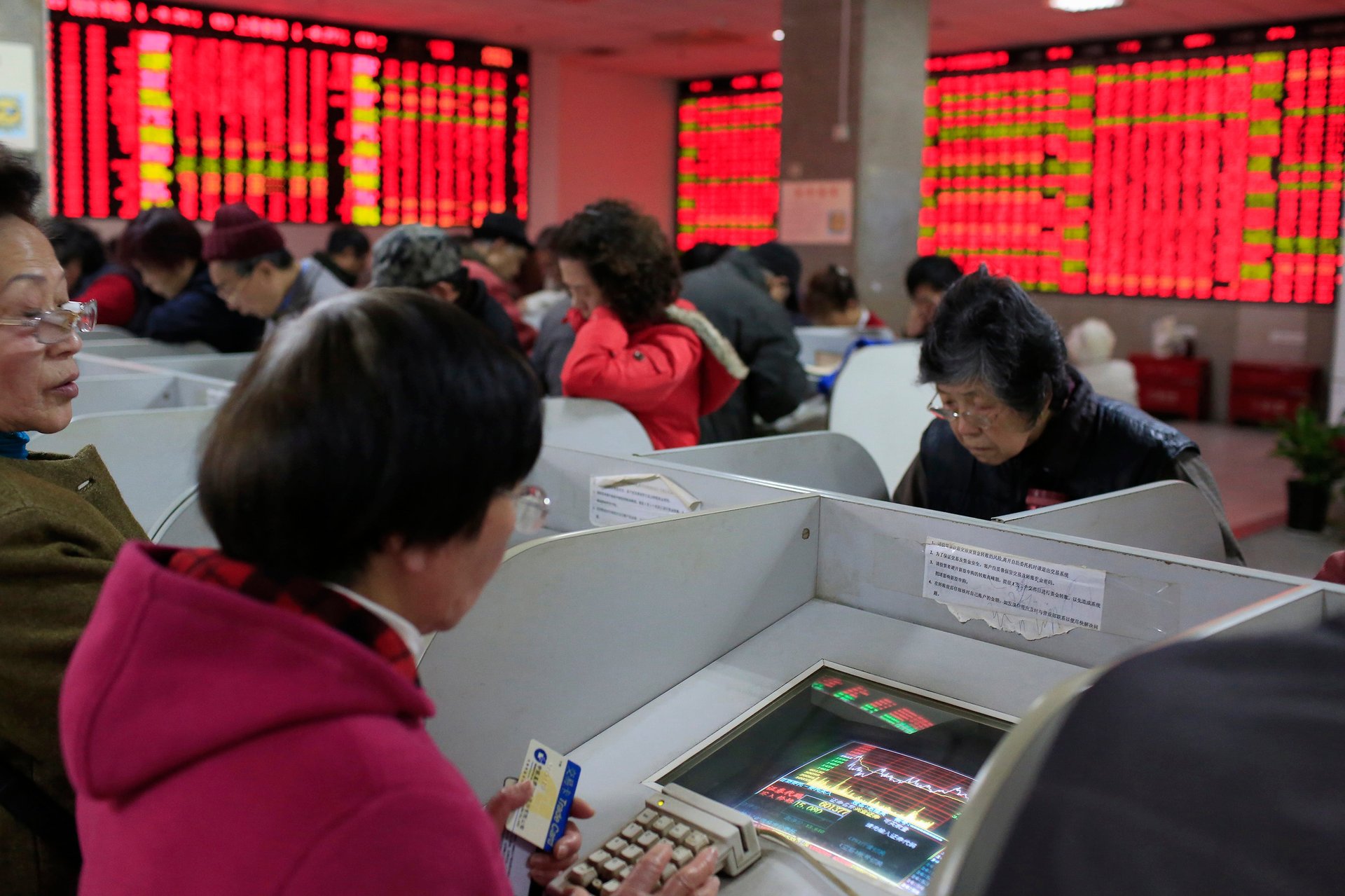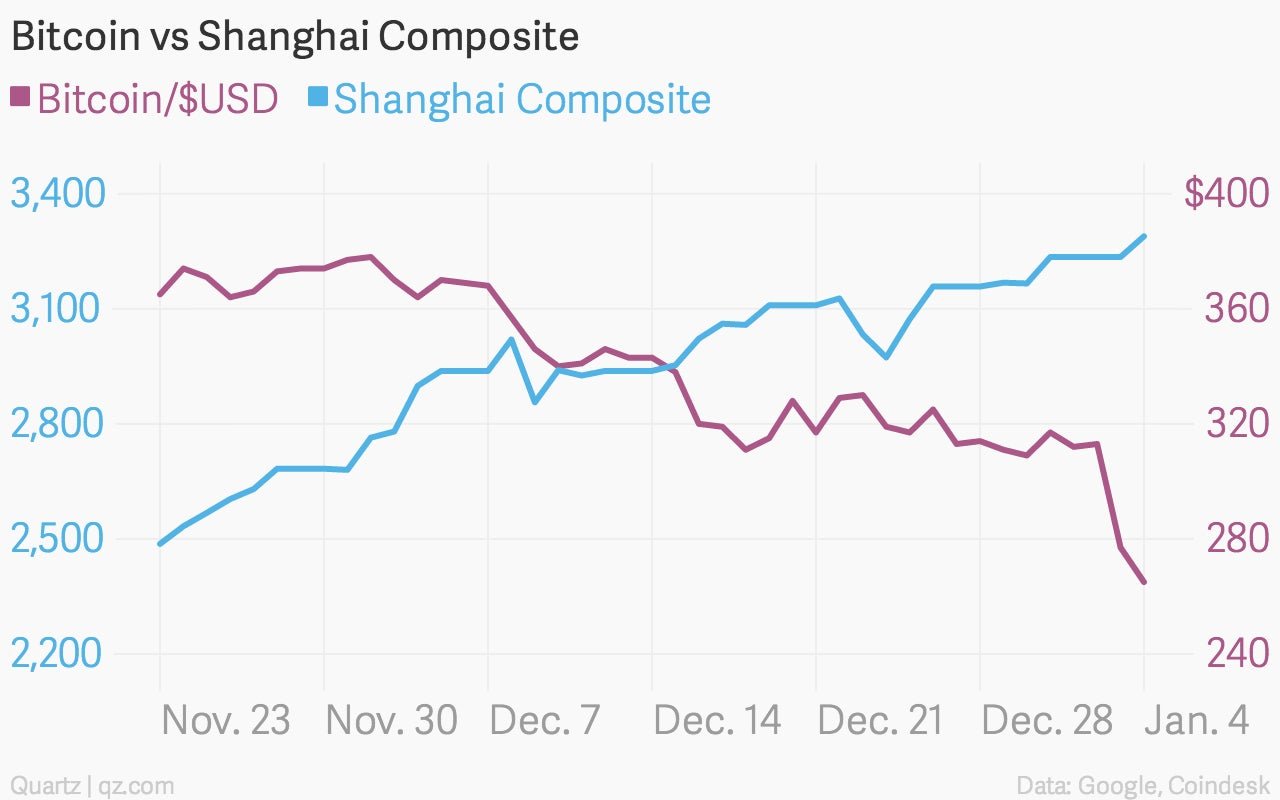China’s rallying stock market could be the cause of this weekend’s bitcoin crash
If you thought 2014 was a bad year to buy bitcoins, 2015 is starting off even worse.


If you thought 2014 was a bad year to buy bitcoins, 2015 is starting off even worse.
Bitcoin was not only the worst performing currency last year, it was the worst area of investment. The bitcoin-US dollar rate fell 59% to around $313 in 2014. And in the first few days of the new year, that decline is only accelerating.
Late Friday, bitcoins were still trading around $314.77, but over the weekend, they plunged as low as $257.71, a loss of 18% over a couple of days. As of this morning, the rate had recovered somewhat to $271.66. The selloff is hitting other crypto-currencies as well, such as Ripple and Litecoin.
What’s going on? No one seems to have a clear answer. The number of bitcoin transactions has slowed during the holidays, although the slowdown looks to be seasonal. Trading in many financial markets also slows down in the days following New Year’s, but volume on the busiest exchanges in the US and China has been robust during the selloff.
Instead, the bitcoin plunge seems instead to be speculative in nature. Speculative trading has plagued bitcoin exchanges since late 2013. In September of that year, bitcoins traded at $123 but surged as high as $1,150 – comparable to the price of an ounce of gold – in two short months. Many traders began to believe that bitcoin would reach $10,000 in 2014.
The bitcoin rally ended after China, reasoning that bitcoin was a commodity and not a true currency, barred financial and payment institutions from using bitcoin. This brief but intense bubble shows how volatile bitcoin can be: Prices may have plummeted over the past 12 months, but they’ve still more than doubled over the past 14 months.
Despite the crackdown, bitcoin activities like mining thrived in China and elsewhere last year. But the speculative rally never resumed, for a couple of reasons. Bitcoin’s volatility put off mainstream investors, many of whom understood little about the new exchanges and wallets that sprung up to help them buy bitcoins.
While demand remained low, bitcoin miners continued to churn out coins. An arms race among miners broke out, with some companies building powerful data centers. To pay for gear and electricity, miners often sold the coins they mined, adding to the supply available on exchanges. As a result, supply steadily expanded while demand stayed slack.
All of those factors were present throughout 2014, though, so why is the selloff accelerating? One possible explanation may involve China’s decision to deem bitcoin a commodity. Chinese bitcoin exchanges have flourished over the past 14 months, a rise that coincided with the bitcoin bubble. The late 2013 surge in bitcoin came just as China was threatening to crack down on real estate speculation, a threat it made good on with higher property taxes.
China’s rising middle class has relatively few asset classes to invest in. For a while, bitcoin seemed like a promising one, with Chinese stocks slumping and real estate speculation cooling off. But over the past few months, Chinese stocks have caught on fire, so that the Shanghai Composite Index closed 2014 up 56 percent.
The Shanghai rally gained steam in the last six weeks of 2014, coinciding with a slump in bitcoin prices. So it’s possible that the speculative air flowing back into stocks on Chinese exchanges is coming at the expense of the market for bitcoins. In the past six weeks, bitcoin prices have fallen 27%, while the Shanghai Composite has risen 30%.

The silver lining is that reduced speculation in bitcoin might make for more stable exchanges that are more attractive to mainstream users who are curious about bitcoin. The risk is the selling continues for long enough to deter not just potential consumers who want to spend bitcoins but also the venture capitalists who have been investing aggressively in the ecosystem. If that happens, it could slow bitcoin’s development for a few years.